#Some such yogas that keep kidney health
Note
Just checking in to see if things are alright on your end? You haven’t posted in quite some time which isn’t like you. If you’re not wanting to make stuff anymore, totally cool and understandable. But just wanted to make sure you’re okay? 💕
Dear anon,
thank you for your kind message. The situation is stable: my physique is fine and my mind is kind of…mh…confused. lol I'm sorry I haven't posted anything lately but life (and my mind) are playing against me.
My husband is recovering good from the heart attack he had 4 months ago: blood pressure is fine even without 2 of the pills he was priscribed when he left hospital, but we're still taking care to his kidneys. I'm still over-protective of him and this take great part of my mental energies. Also, I have the bad habit to try to keep everything under control, and this takes the other great part of mental energies.
In addition to that, I'm still technologically handicapped: my pc broke, also my pc keyboard broke as well as my smartphone (I swear I didn't thow them against a wall), so I using old stuff in place of that I used before. Also, internet connection is not exactly the fastest on earth where I live. As you can imagine, in this situation making gifs and loading them on Tumblr (or even load Tumblr itself for reblogging) are not the most relaxing things to do. I tried to do it for some time, but the whole process is really too draining, really exasperating. With all that happened I don't even have enough mental order to focus on writing. Nient, my mind is in "safe mode", can handle only survival stuff: eat, health, work. (I mean, it took me a week to reply to your message!)
The little spare time I have, though, I try to use it in the most relaxing way possibile: I read, I do meditation, and I even started doing yoga with my husband (just yesterday we had our first lesson!). And I accompany my husband in his daily walks.
I hope I'll be back posting here soon. I haven't forgotten the requests I received and the subcollection I have to complete, I'm just waiting better times. Many thanks to all the people who still share and like my old posts, the support is really appreciated!
Hope you, instead, are doing great? :)
Take care and be safe.
Best,
L
16 notes
·
View notes
Note
did you ever need to take sth like antidepressants for anxiety or panick attacks? I recall you speakin about having dealth with them in the past & been wonderin if you ever tried medicating urself for it / would consider it if your nerves were getting too much 4 u at some point down the line or did you develop ur own way around those little&big pits of hell
xX
heyyyyy <3 (this will b long but this question deserves a thorough answer so hope thats ok)
ive been strongly encouraged to take various medications over the years, particularly for anxiety/mood stabilisation, and twoish weeks ago i ended up in hospital cause literally i lost my mind, and i felt so out of it that thats the first time i ever considered not just wanting, but needing medication in order to function. however, i didnt, cause i dont like making decisions in the moment (desperation leads to desperate decisions) and because before that experience and even during it, ive never felt convinced that medication was the solution to the problems i was facing. 1) due to the physical, mental and emotional side effects. & 2) because im not convinced the people prescribing the meds even know what is 'wrong' with me.— a lot of that has to do with the nhs being a mess, (its quicker to get meds than wait thru the referral time to get diagnosed & into therapy) but also, theres a lot of comorbidity in the diagnosis ive been given, so there are multiple things to treat & in their eye's medication gives a faster result than unpacking all of that individually. the recommendation was to put me on a cocktail of drugs that can fuck up my liver kidneys and endocrine system to 'see if it will work' .. :/.
the only thing that has ever worked for me is sitting with myself and my emotions, acknowledging them, doing things at my pace in my time, and structuring my life in a way that is tailored for me and my success rather than being successful in the world or in a socially accepted way. that means having a morning routine that caters to my mental emotional and physical health, (mindful practices, yoga, gardening, sound work etcetc), and finding ways to continue that throughout the day (working creatively and limiting my exposure to people or situations that are not for me/overstimulate me).
that being said, this routine (which is still being refined and altered) works pretty well for me, but comes with sacrifices and isnt fool proof. symptoms of my mental illness still persist & without being medicated people are less lenient when helping someone they feel isnt 'helping themselves', im also still working on how to be as sociable as id like to be, and often my spirals are triggered by the very system i have in place to help me. i often face feeling like a let down, like im lazy, like im a weirdo/recluse, like im incapable of being a normal person etc etc. for example, a lot of the friends i graduated with have experienced crazy growth in their careers and have a sense of social and financial security that i dont have because they can function year round, whereas i have months at a time where i dont feel myself and have to disappear in order to keep sanity and peace in my being, lol. that, and the fact that it takes me a lot of base maintenance and effort to function as a normal person makes me feel like shit if i let it, so i constantly have to remind myself on top of the work i do daily, that whilst there are things others have/experience, that i dont, the inverse is also true, and theres beauty to me being me in my way. and .. yeah 🤷🏽♀️. that part is hard. but its also worth it to me and has taught me a lot
all that being said, do your own research and decide what feels right and what is best for YOU. speak to your doctors, therapists, and friends who may be medicated, or look on forums online for perspectives from both sides. [*if anyone reading this has a helpful opinion 2 offer pls comment]. the feeling of helplessness when your in the throws of whatever mental illness you suffer from can be debilitating and if taking a pill everyday or when you need it can fix that, no ones opinion should sway you from doing what you need to do to function. some of my friends who are medicated swear by medication!! (particularly when it comes to adhd meds) cause not being able to process thoughts and function is horrible and ruins lives needlessly.
so yh.. i hope this helps. as long as you do whats best for you, i have no doubt you will find your way through this and that it will be worth it. above all, know that the power of your will, your mind, and your person, is what makes you special, and so even if it takes more for you to show up than it does others, that's absolutely fine. take your time with it, and know what nothing is wasted, because you have no idea the good that can come from working out the details. most of the advice i have to offer comes from making it thru an existential crisis or bout of depression. <3
blessings 2 u love
6 notes
·
View notes
Text
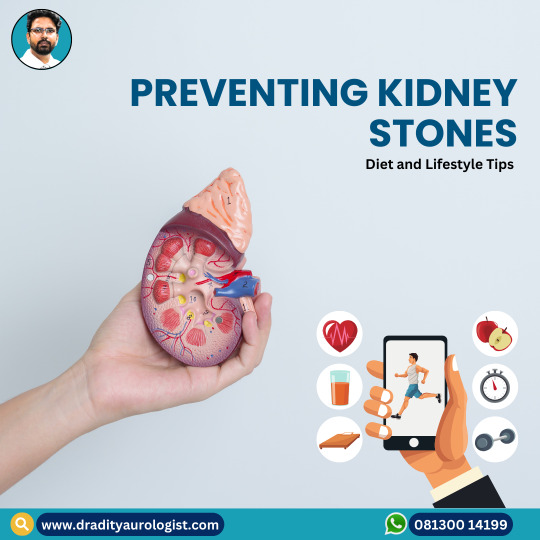
Preventing Kidney Stones: Diet and Lifestyle Tips for Optimal Renal Health
Discover effective diet and lifestyle tips to prevent kidney stones. Learn from experts at the best endourology care in Lucknow. Find urological solutions near you.
In today’s fast-paced world, maintaining optimal health is crucial, and one aspect often overlooked is kidney health. Kidney stones, though seemingly small, can cause significant discomfort and even lead to serious complications if left unchecked. However, by adopting simple yet effective diet and lifestyle changes, you can prevent the formation of kidney stones and promote overall renal health.
Understanding Kidney Stones:
Before delving into prevention strategies, it’s essential to grasp what kidney stones are and how they form. Kidney stones are hard deposits of minerals and salts that form in the kidneys. They can vary in size, from as small as a grain of sand to as large as a golf ball, and may cause excruciating pain when passing through the urinary tract.
Several factors contribute to the formation of kidney stones, including dehydration, dietary habits, and genetic predisposition. However, the good news is that many cases of kidney stones can be prevented through proactive measures.
Dietary Modifications:
One of the primary drivers of kidney stone formation is an imbalance of certain minerals and salts in the body. Therefore, making dietary adjustments is key to preventing their recurrence. Here are some dietary tips to reduce your risk of developing kidney stones:
Stay Hydrated: Adequate hydration is crucial for preventing kidney stones. Aim to drink at least 8 glasses of water per day to keep your urine diluted and flush out toxins effectively.
Limit Sodium Intake: High sodium levels can increase the risk of kidney stone formation. Opt for low-sodium alternatives and avoid processed foods, which are often high in salt content.
Moderate Protein Consumption: Diets rich in animal proteins, such as red meat and poultry, can contribute to the formation of kidney stones. Consider incorporating more plant-based protein sources like legumes and tofu into your meals.
Calcium-Rich Foods: Contrary to popular belief, consuming adequate amounts of calcium can actually help prevent kidney stones by binding with oxalates in the digestive tract. Include calcium-rich foods such as dairy products, leafy greens, and fortified foods in your diet.
Limit Oxalate-Rich Foods: While calcium is beneficial, excessive intake of foods high in oxalates, such as spinach, nuts, and chocolate, can increase the risk of kidney stone formation. Consume these foods in moderation and consider pairing them with calcium-rich foods to mitigate their effects.
Lifestyle Changes:
In addition to dietary modifications, certain lifestyle changes can further reduce your risk of developing kidney stones:
Maintain a Healthy Weight: Obesity is a known risk factor for kidney stones. By adopting a balanced diet and regular exercise routine, you can achieve and maintain a healthy weight, thus reducing your risk of stone formation.
Exercise Regularly: Regular physical activity not only helps maintain a healthy weight but also promotes overall kidney function. Aim for at least 30 minutes of moderate exercise most days of the week.
Manage Stress: Chronic stress can contribute to dehydration and poor dietary choices, increasing the risk of kidney stones. Practice stress-reduction techniques such as meditation, yoga, or deep breathing exercises to keep stress levels in check.
By incorporating these diet and lifestyle tips into your daily routine, you can take proactive steps towards preventing kidney stones and safeguarding your renal health. Remember, prevention is always better than cure. For personalized advice and expert urological care, consult with specialists at the best endourology care center in Sector B, Lucknow, or explore urological solutions near you. Your kidneys will thank you for it!
Dr Aditya Sharma MCh Urologist (Gold Medalist) Uro-oncology Kidney Transplant Robotic Surgeon
Address: Kanpur - Lucknow Rd, Sector B, Bargawan, LDA Colony, Lucknow, Uttar Pradesh 226012
Phone: 081300 14199
Website: https://dradityaurologist.com/
#best endo urology care in sector b lucknow#best female urology care dr. aditya sharma#best general urology care near me#best pediatric urology care#best uro oncology care near me#kidney transplant near me#male infertility care near me
0 notes
Text
Understanding Hypertension: Causes, Effects, and Management

First of all,
High blood pressure, or hypertension, is a widespread medical issue that affects millions of individuals globally. Even though hypertension is common, it frequently goes misdiagnosed and untreated, endangering people's health in serious ways. We explore the causes, consequences, and treatment options for hypertension in this piece in an effort to provide readers a thorough grasp of this important medical condition.
The reasons for hypertension:
Numerous causes, such as underlying medical disorders, bad lifestyle choices, and genetic predispositions, can result in hypertension. Family history is important because people who have a history of hypertension in their family are more likely to get the illness themselves. In addition, lifestyle choices including smoking, excessive alcohol consumption, poor diet, and lack of physical activity all contribute to the development of hypertension.
Moreover, a number of illnesses can cause blood pressure to rise, including thyroid issues, kidney problems, and sleep apnea. In those who are vulnerable, long-term stress and some medications, such as oral contraceptives and nonsteroidal anti-inflammatory drugs (NSAIDs), can make hypertension worse.
Impact of High Blood Pressure:
Uncontrolled hypertension raises the chance of developing a number of problems and can have serious effects on general health. Long-term high blood pressure strains the heart and raises the risk of heart failure, heart attacks, and coronary artery disease. Moreover, it can harm blood arteries all throughout the body, raising the risk of peripheral artery disease, kidney damage, and stroke.
Furthermore, early-stage hypertension frequently exhibits no symptoms, which is why it is referred to as "the silent killer." Many people might not become conscious of their high blood pressure until they encounter a hypertensive crisis or face problems. Regular blood pressure monitoring is therefore necessary for early identification and treatment.
Management of Hypertension: Fortunately, medicine may be used in conjunction with lifestyle changes to effectively control hypertension. A key factor in lowering the risk of problems and regulating blood pressure is changing one's lifestyle. Among them are eating a diet low in salt, saturated fats, and added sugars and high in fruits, vegetables, whole grains, and lean meats to promote heart health. Frequent exercise, such as swimming, cycling, or brisk walking, can also help decrease blood pressure and enhance general health.
Medication may be recommended to people with hypertension in addition to lifestyle changes, particularly if they are at higher risk or have noticeably higher blood pressure. Antihypertensive drugs function by lowering blood pressure, diluting blood, or lightening the heart's strain. Diuretics, ACE inhibitors, beta-blockers, calcium channel blockers, and angiotensin II receptor blockers (ARBs) are among the drugs that are frequently administered. It's critical to take these drugs as directed by your doctor and to keep up with follow-up visits so that your blood pressure may be checked and treated as necessary.
Complementary therapies can also help lower blood pressure and enhance general wellbeing. These include stress reduction methods like yoga, meditation, and deep breathing exercises. But rather than taking the place of traditional medical care, these should supplement it. In summary:
Although common, hypertension is a treatable disorder that needs to be managed proactively in order to avoid consequences and protect general health. Through knowledge of the causes, consequences, and techniques for managing hypertension, people can take charge of their health and lower their risk of cardiovascular disease and other related issues. Effective hypertension management requires regular blood pressure checks, adherence to prescribed medication regimens, and good lifestyle choices. People can successfully manage their blood pressure and enjoy satisfying lives with the right support and care.
0 notes
Text
What is the Strongest Natural Painkiller?
Whether it is a headache, a tense muscle, or something more serious, pain is a part of existence. We frequently grab medication to get relief from pain when it occurs. Yet, there are some very effective painkillers found in nature.
To find the best natural pain relievers for various kinds of pain, let's explore the world of natural remedies.

What is the strongest natural painkiller?
Natural Painkillers
Natural analgesics are compounds with analgesic effects that come from plants, animals, or minerals.
These substances function by either blocking pain receptors or decreasing inflammation, which interferes with the capacity of the body to transmit pain signals.
The Strongest Natural Painkillers
1. Capsaicin
Capsaicin, which is present in chili peppers, relieves pain by reducing skin pain receptors, which makes it useful for treating diseases like nerve and arthritic pain.
2. Salicin
Salicin, which comes from willow bark, is transformed by the body into salicylic acid, which relieves mild to moderate pain, headaches, and muscle aches. This process is comparable to that of aspirin.
3. Turmeric
Turmeric's active ingredient, curcumin, has potent anti-inflammatory qualities that make it helpful in reducing joint pain and inflammation brought on by diseases like osteoarthritis.
4. CBD (Cannabidiol)
Originating from the cannabis plant, CBD is known for its anti-inflammatory and analgesic properties that provide relief from persistent pain conditions without the psychotropic properties of THC.
5. White Willow Bark
White willow bark contains salicin, which relieves headaches, menstrual cramps, and musculoskeletal pain, much like aspirin does.
6. Kratom
Kratom is made from the leaves of the Mitragyna speciosa tree. It contains alkaloids, such as mitragynine and 7-hydroxymitragynine, which bind to opioid receptors to provide relaxation and pain relief.
Application and Dosage
It is necessary to take natural pain relievers as directed and in moderation.
Speaking with your doctor is advised, particularly if you are taking any other medications or have underlying medical conditions.
Certain natural pain relievers may have negative effects on sensitive people or interact negatively with other medications.
Potential Side Effects and Risks
Some being widely regarded as safe, natural pain relievers can still be dangerous, particularly if used excessively or for extended periods.
Allergies, gastrointestinal distress, and drug interactions are a few such side effects.
Natural pain relievers should be used with caution by people who have certain medical conditions, such as liver disease, kidney disease, or bleeding disorders.
Exploring Complementary Therapies
Complementary therapies can be very helpful in managing pain in addition to natural pain relievers.
It has been shown that methods like acupuncture, massage therapy, and mindfulness meditation can lessen the intensity of pain as well as improve general well-being.
Combining these therapies with all-natural pain relievers can offer an effective way of treating pain that takes responsibility for both its psychological and physical components.
Lifestyle Modifications for Pain Management
Lifestyle changes can improve pain management even more when combined with complementary therapies and natural painkillers.
Pain can be lessened and general health can be enhanced by engaging in regular exercise, keeping a healthy weight, and eating a balanced diet full of foods high in anti-inflammatory components.
Deep breathing exercises and other stress-reduction methods like yoga can also reduce tension and encourage relaxation, which lessens the perception of pain.
The Importance of Individualized Treatment
Since pain is a subjective experience, what relieves one person's pain may not relieve another's.
It is critical to customize treatment plans to each patient's needs, taking into factor things like underlying medical issues, personal preferences, and the kind and intensity of pain.
Finding the best pain management plan for each individual can be facilitated by closely collaborating with medical experts and considering a range of alternatives.
more >>>
1 note
·
View note
Text
The Relationship Between Sleep and Detox
In our fast-paced modern world, sleep is often sacrificed in favor of work, social commitments, and other activities. However, what many people may not realize is that sleep plays a crucial role in the body's detoxification processes. Getting an adequate amount of quality sleep is essential for supporting our body's natural detox mechanisms and promoting overall health and well-being. In this blog post, we'll explore the intricate relationship between sleep and detox and how prioritizing sleep can enhance your body's ability to cleanse and rejuvenate. Plus, don't forget to visit our website at Healthy Organic Essentials for more information on holistic wellness and natural health solutions.

Understanding Detoxification: Detoxification is the body's process of eliminating toxins and waste products to maintain optimal health. Our bodies are equipped with several organs and systems, including the liver, kidneys, lymphatic system, and skin, that work together to detoxify and eliminate harmful substances from the body. However, the effectiveness of these detoxification processes can be influenced by various factors, including lifestyle habits, dietary choices, and sleep quality.
The Role of Sleep in Detox: Sleep plays a vital role in supporting the body's detoxification processes in several ways:
Glymphatic System Activation: During sleep, the glymphatic system, a waste clearance system in the brain, becomes highly active. This system helps remove toxins, including beta-amyloid proteins associated with Alzheimer's disease, from the brain. Adequate sleep is essential for the proper functioning of the glymphatic system and the clearance of toxins from the brain.
Hormonal Regulation: Sleep influences the release of hormones that play a role in detoxification and cellular repair. Growth hormone, for example, is released during deep sleep stages and helps promote tissue repair and regeneration. Cortisol, the stress hormone, is also regulated during sleep, and disruptions in sleep patterns can lead to imbalances in cortisol levels, which may impair detoxification processes.
Cellular Repair and Regeneration: Sleep is a time for cellular repair, regeneration, and renewal. During sleep, the body undergoes various repair processes at the cellular level, including DNA repair, protein synthesis, and detoxification. Adequate sleep allows the body to prioritize these essential repair processes, supporting overall detoxification and cellular health.
Immune Function: Sleep plays a crucial role in supporting immune function, which is closely intertwined with detoxification. Adequate sleep helps regulate immune responses, enhances immune surveillance, and promotes the production of immune cells that play a role in identifying and eliminating toxins and pathogens from the body.
Prioritizing Sleep for Optimal Detoxification: Given the importance of sleep in supporting detoxification, it's essential to prioritize sleep and establish healthy sleep habits. Here are some tips for improving sleep quality and promoting detoxification:
Maintain a consistent sleep schedule by going to bed and waking up at the same time every day, even on weekends.
Create a relaxing bedtime routine to signal to your body that it's time to wind down. This may include activities such as reading, taking a warm bath, or practicing relaxation techniques like deep breathing or meditation.
Create a sleep-friendly environment by keeping your bedroom cool, dark, and quiet, and investing in a comfortable mattress and pillows.
Limit exposure to electronic devices, caffeine, and stimulating activities before bedtime, as these can interfere with sleep quality.
Practice stress management techniques to reduce anxiety and promote relaxation, such as yoga, meditation, or journaling.

Sleep plays a crucial role in supporting the body's natural detoxification processes, promoting cellular repair and regeneration, and enhancing overall health and well-being. By prioritizing sleep and establishing healthy sleep habits, you can optimize your body's ability to cleanse, rejuvenate, and thrive.
For more information on holistic wellness and natural health solutions, visit our website at Healthy Organic Essentials. Here, you'll find a wealth of resources to support your health journey and empower you to live your best life. Embrace the power of sleep for optimal detoxification and vibrant health!
0 notes
Text
Hormonal Balance and Detoxification
In the intricate symphony of our bodies, hormonal balance plays a crucial role in maintaining overall health and well-being. From regulating metabolism and mood to influencing reproductive functions and sleep patterns, hormones are the silent conductors orchestrating various bodily processes. However, in today's world, our bodies are constantly bombarded with toxins from environmental pollutants, processed foods, and stressors, disrupting this delicate equilibrium.

Understanding Hormonal Balance:
Hormones are chemical messengers produced by various glands in the endocrine system. These messengers travel through the bloodstream, affecting tissues and organs throughout the body. Even a slight imbalance in hormone levels can lead to a cascade of health issues, ranging from fatigue and weight gain to infertility and mood disorders.
The Role of Detoxification:
Detoxification is the body's natural process of eliminating harmful substances and toxins. However, in our modern lifestyles, our bodies often struggle to keep up with the overwhelming influx of toxins. This overload can hinder the liver, kidneys, and other organs responsible for detoxification, leading to toxin buildup and hormonal imbalances.
Reclaiming Balance:
Fortunately, there are steps we can take to support our bodies in detoxification and restore hormonal balance. Here are some strategies to consider:
Clean Eating: Opt for whole, nutrient-rich foods while minimizing processed and refined products. Incorporate plenty of fruits, vegetables, lean proteins, and healthy fats into your diet to provide essential nutrients for detoxification pathways.
Stay Hydrated: Water is essential for flushing out toxins and supporting cellular functions. Aim to drink plenty of water throughout the day to keep your body hydrated and aid in detoxification processes.
Regular Exercise: Physical activity not only helps to maintain a healthy weight but also promotes circulation and lymphatic drainage, aiding in the removal of toxins from the body. Incorporate both cardiovascular exercise and strength training into your routine for optimal benefits.
Stress Management: Chronic stress can disrupt hormone balance and impair detoxification pathways. Practice stress-reducing techniques such as meditation, yoga, deep breathing exercises, or spending time in nature to promote relaxation and support overall well-being.
Supplementation: Certain supplements can support detoxification processes and hormone balance. Consult with a healthcare professional to determine which supplements may be beneficial for your specific needs.

For those seeking comprehensive support in achieving hormonal balance and detoxification, PureBodyXtra offers a range of natural products crafted to promote optimal health and vitality. From detoxifying teas to hormone-balancing supplements, our carefully curated selection is designed to support your journey towards holistic wellness.
Visit our website here to learn more about our products and discover how you can reclaim harmony in your body and mind. Take the first step towards a healthier, more balanced life today.
Remember, achieving hormonal balance and supporting detoxification is a journey, not a destination. By incorporating these strategies into your daily routine and making informed choices about your health, you can empower yourself to thrive in a world filled with toxins and stressors. Embrace the power of balance and embark on a path towards vitality and well-being.
0 notes
Text
The Glucagon Challenge: Balancing Blood Sugar Levels Naturally
The Glucagon Challenge is an approach to balancing blood sugar levels naturally by focusing on lifestyle factors such as diet, exercise, stress management, and sleep. Glucagon is a hormone produced by the pancreas that plays a crucial role in regulating blood sugar levels. While insulin is responsible for lowering blood sugar, glucagon works to raise it when levels are too low.
Here are some strategies for meeting the Glucagon Challenge:
Balanced Diet: Eating a balanced diet that includes complex carbohydrates, lean proteins, healthy fats, and plenty of fiber can help regulate blood sugar levels. Avoiding refined sugars and processed foods can prevent spikes and crashes in blood sugar.
Regular Exercise: Engaging in regular physical activity can improve insulin sensitivity and help control blood sugar levels. Both aerobic exercise and strength training are beneficial. Aim for at least 150 minutes of moderate-intensity exercise per week, as recommended by health guidelines.
Stress Management: Chronic stress can contribute to imbalanced blood sugar levels. Incorporating stress-reducing activities such as meditation, deep breathing exercises, yoga, or spending time in nature can help manage stress and promote hormonal balance.
Adequate Sleep: Poor sleep habits can disrupt hormone regulation, including insulin and glucagon. Aim for 7-9 hours of quality sleep per night to support optimal blood sugar control.
Portion Control: Monitoring portion sizes and eating smaller, more frequent meals throughout the day can prevent large fluctuations in blood sugar levels. This approach helps keep energy levels stable and prevents overeating.
Hydration: Staying hydrated is important for overall health, including blood sugar regulation. Drinking plenty of water throughout the day can help support proper kidney function and prevent dehydration, which can affect blood sugar levels.
Limit Alcohol: Excessive alcohol consumption can disrupt blood sugar levels and interfere with hormonal balance. Limiting alcohol intake or avoiding it altogether can help maintain stable blood sugar levels.
Regular Monitoring: Keep track of blood sugar levels regularly, especially if you have diabetes or prediabetes. This allows you to identify patterns and make necessary adjustments to your lifestyle or treatment plan.
Consultation with Healthcare Provider: If you have diabetes or suspect you may have blood sugar imbalances, consult with a healthcare provider. They can provide personalized recommendations and guidance based on your individual health status and needs.
By implementing these strategies and embracing the Glucagon Challenge, individuals can take proactive steps to naturally balance blood sugar levels and promote overall health and well-being.
0 notes
Text
Unveiling the Unseen: Understanding and Caring for BetaBeat Type 2 Symptoms
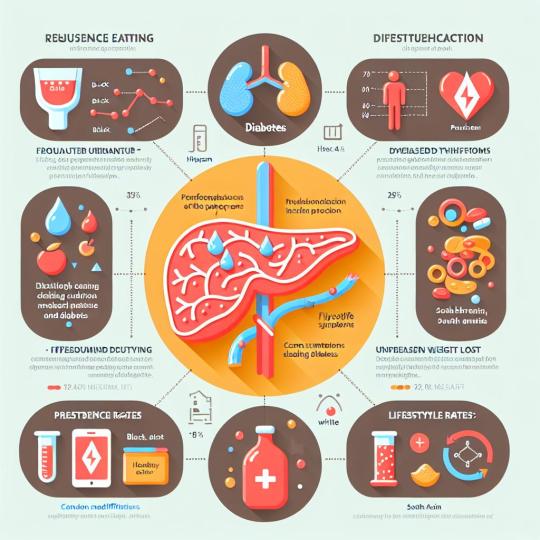
Welcome to a comprehensive guide on understanding and caring for BetaBeat Type 2 symptoms. As an experienced content marketer in the healthcare industry, I've compiled this SEO-friendly content to help you navigate the intricacies of living with Type 2 symptoms and offer practical tips for managing your condition effectively. Join me on this informative journey as we delve into the symptoms, care strategies, and the importance of staying proactive in your health and wellness.
Section 1: Understanding BetaBeat Type 2 Symptoms
BetaBeat Type 2, also known as BB-T2, is a chronic health condition that affects millions of individuals worldwide. It manifests through a variety of symptoms that can significantly impact one's quality of life. Some key symptoms associated with BB-T2 are:
1. Fatigue and Lethargy:
Individuals with BB-T2 often experience persistent tiredness and lack of energy, even after adequate rest.
2. Frequent Urination and Increased Thirst:
The body's inability to regulate blood sugar levels adequately leads to excessive urination and increased thirst.
3. Unexplained Weight Loss or Gain:
BB-T2 can cause unexplained fluctuations in body weight due to the body's inability to utilize insulin effectively.
4. Slow Healing of Wounds:
Delayed wound healing is a common symptom in individuals with BB-T2, as high blood sugar levels hamper the body's natural healing processes.
Section 2: Essential Care Strategies for Managing BB-T2 Symptoms
While BB-T2 is a lifelong condition, proactive management can significantly improve one's overall well-being. Here are some crucial care strategies for effectively managing betaBeat Type 2 symptoms:
1. Blood Sugar Monitoring:
Regular blood sugar monitoring is vital to keep levels within the target range. Utilize a reliable blood glucose monitor and work with your healthcare provider to establish an appropriate testing routine.
2. Medication Adherence:
Consistently taking prescribed medications, such as oral antidiabetic drugs or insulin, is essential for maintaining stable blood sugar levels. Ensure you understand the correct dosages, timing, and potential side effects of your medications.
3. Balanced Diet:
Adopting a well-balanced diet rich in fruits, vegetables, whole grains, and lean proteins can help regulate blood sugar levels. Consult with a registered dietitian to create a personalized meal plan that aligns with your nutritional needs and BB-T2 management goals.
4. Regular Exercise:
Engaging in regular physical activity helps improve insulin sensitivity, lowers blood sugar levels, and promotes overall cardiovascular health. Aim for at least 150 minutes of moderate-intensity exercise every week, such as brisk walking, swimming, or cycling.
5. Stress Management Techniques:
Chronic stress can negatively impact blood sugar control. Practice stress-reducing techniques like deep breathing, meditation, yoga, or engaging in hobbies to promote emotional well-being.
Section 3: The Importance of Regular Check-ups and Medical Support
Managing BB-T2 symptoms effectively requires regular check-ups and collaboration with healthcare professionals. Here's why it's essential to prioritize medical support:
1. Regular Health Assessments:
Routine visits to your healthcare provider enable monitoring of blood sugar levels, identification of potential complications, and adjustments to your treatment plan, if necessary.
2. Preventive Screenings:
Diabetes increases the risk of various health complications such as cardiovascular disease, kidney problems, and eye disorders. Regular screenings for these conditions can help detect and address them early.
3. Diabetes Education:
Participating in diabetes education programs offered by healthcare providers can deepen your understanding of BB-T2, enhance self-care skills, and foster a proactive approach to managing symptoms.
Section 4: Conclusion
Living with BetaBeat Type 2 symptoms can be challenging, but with the right knowledge and care, you can maintain a fulfilling life while effectively managing your health. By understanding the symptoms, implementing crucial care strategies, and seeking regular medical support, you empower yourself to live a balanced and healthy life. Remember, every small step towards self-care counts, and you're not alone on this journey.
Tags:
1. BetaBeat Type 2 Symptoms
2. Diabetes Care
3. Chronic Disease Management
4. Health and Wellnes
If you or a loved one is living with diabetes, exploring our website can provide valuable insights into managing diabetes effectively.
Read the full article
0 notes
Text
Discover How Running Energizes Your Whole Body, Especially Your Kidneys
<h1>How Running Helps Your Kidneys</h1>
<p>Running is one of the easiest ways to stay fit. All you need is a pair of sneakers! More and more people are hitting the trails because running is free and great for your health. It improves immunity and metabolism. When you make running a regular part of your routine, you'll notice benefits like better blood flow. This helps every part of your body work better. But how exactly does running help out your kidneys?</p>
<h2>The Basics of Running Form</h2>
<p>There's no single "right" way to run. The main thing is moving smoothly without straining your muscles. Good posture is key - things like pushups and situps beforehand can prepare your body. When running, keep your head up and look straight ahead. Relax your arms at your sides. Land on your feet under your center of gravity as you stride forward. Beginners tend to take too big of steps, overreaching as their foot hits the ground.</p>
<h2>General Health Perks</h2>
<p>Running boosts your whole body in lots of ways. It speeds up your metabolism so your body burns calories more efficiently. Staying active is a simple way to feel better. Of course, listen to your limits - find a pace you can keep up without getting wiped out. Control your breathing while on the move too.</p>
<h2>Traditional Chinese vs. Western Medicine Views</h2>
<p>In Chinese medicine, the kidneys aren't just the organ - they represent your whole reserves of energy and well-being. Too much stress or not fueling your body right can drain your kidneys. Late night runs may do more harm than good. Your body needs recovery to recharge.</p>
<h2>Exercise for Stronger Kidneys</h2>
<p>Lots of guys struggle with low energy due to a sedentary lifestyle and poor diet. Here are some moves that can give your kidneys an awesome boost:</p>
<h3>Butt Exercises</h3>
<p>Squeeze and release your butt muscles as you breath in and out. No one's watching - do this anytime, anywhere for energized kidneys!</p>
<h3>Tai Chi</h3>
<p>Contrary to rumors, Tai Chi's not just for grandparents. It's a graceful, trendy way to relax both mind and body. Abroad it's as hip as yoga!</p>
<h3>Lower Back Rub</h3>
<p>Warm hands with friction, then gently massage your lower back until it feels toasty. Morning and night for chilled kidneys.</p>
<p>Hope this helps explain running's perks for your renal reserves. Making running a habit, along with other lifestyle tweaks, protects your energy levels for years to come. Stay healthy, friends!</p>
0 notes
Text
Adrenal Insights: Unpacking the Role of the Adrenal Glands

Introduction:
The adrenal glands, small but mighty, play a crucial role in our overall well-being. From managing stress to regulating metabolism, these walnut-sized glands located on top of each kidney are true powerhouses. In this blog post, we will dive into the fascinating world of the adrenal glands, exploring their functions, the impact of stress, and how to keep these vital organs in balance.
1. The Basics: Understanding the Adrenal Glands:
Let's start with the basics. What exactly are the adrenal glands, and where are they located? This section will provide an overview of the anatomy and function of the adrenal glands, highlighting their role in producing hormones essential for life.
2. The Hormones at Play: Cortisol, Adrenaline, and More:
The adrenal glands release a variety of hormones, each with a unique role. We'll explore the primary hormones produced by the adrenals, such as cortisol and adrenaline, and how they influence our response to stress, energy levels, and overall vitality.
3. Stress and the Adrenal Response:
Stress is an inevitable part of life, and our adrenal glands play a central role in our response to stressors. This section will delve into the intricacies of the "fight or flight" response, how chronic stress can impact adrenal health, and the concept of adrenal fatigue.
4. Adrenal Imbalances: Signs and Symptoms:
When the delicate balance of adrenal hormones is disrupted, it can manifest in various ways. We'll discuss common signs and symptoms of adrenal imbalances, including fatigue, sleep disturbances, and changes in mood, and how to recognize when it's time to seek support.
5. Nutrition and Lifestyle for Adrenal Health:
Maintaining the health of the adrenal glands involves more than just addressing stress. This section will explore the role of nutrition, sleep, exercise, and stress management techniques in supporting adrenal health and promoting hormonal balance.
6. Adrenal Disorders: From Addison's to Cushing's:
In some cases, adrenal disorders can occur, affecting the glands' ability to function properly. We'll provide an overview of common adrenal disorders, such as Addison's disease and Cushing's syndrome, their causes, and available treatments.
7. Herbs and Adaptogens for Adrenal Support:
Nature offers a variety of herbs and adaptogens known for their supportive effects on adrenal health. We'll highlight some of these natural remedies and discuss how they can be incorporated into a holistic approach to adrenal care.
8. Mind-Body Practices for Adrenal Harmony:
Mind-body practices, including meditation, yoga, and deep breathing, can have a profound impact on adrenal health. This section will explore the connection between the mind and adrenal glands and offer practical tips for incorporating relaxation techniques into daily life.
Conclusion:
Our adrenal glands are silent heroes, working tirelessly to maintain balance in the face of life's challenges. By gaining insights into their functions, recognizing signs of imbalance, and adopting holistic approaches to care, we can support our adrenal glands and enhance overall well-being. Here's to the adrenal glands – small organs with a big impact on our vitality and resilience.
TX Hospitals is one of the best hospitals in Kachiguda, Uppal, and Banjara hills with the largest healthcare facility and the best team of doctors and specialist surgeons to help patients recover fast from health ailments.
For further information or inquiries, please reach out to us at 9089489089
0 notes
Text
: Navigating Diabetes: A Comprehensive Guide to Natural Methods, Tips, Medicinal Impact, and After Effects**

If you want to known esay ways to control diabetic clik here
In the realm of chronic health conditions, diabetes stands as a formidable adversary, demanding a multifaceted approach for management. This comprehensive guide delves into the intricacies of diabetes, exploring natural methods, offering practical tips, examining medicinal impacts, and shedding light on potential after-effects.
**Understanding Diabetes:**
Diabetes is a metabolic disorder characterized by elevated blood glucose levels, either due to insufficient insulin production (Type 1) or ineffective use of insulin by the body (Type 2). Managing diabetes effectively involves a combination of lifestyle modifications, dietary changes, and, in some cases, medication.
**Natural Methods for Diabetes Management:**
1. **Balanced Diet:**
- Adopting a balanced diet is foundational. Focus on whole foods, including fruits, vegetables, whole grains, lean proteins, and healthy fats. Limiting processed foods and refined sugars helps regulate blood sugar levels.
Best natural suppliment for diabetic
2. **Regular Exercise:**
- Physical activity plays a crucial role in diabetes management. Regular exercise improves insulin sensitivity, helps control weight, and contributes to overall well-being. Aim for a combination of aerobic exercises and strength training.
3. **Weight Management:**
- Maintaining a healthy weight is paramount for diabetes control. Even modest weight loss can have a significant impact on blood sugar levels. Consult with healthcare professionals for personalized weight management plans.
4. **Hydration:**
- Staying well-hydrated supports kidney function and helps regulate blood sugar. Opt for water as the primary beverage, and limit sugary drinks.
5. **Stress Reduction:**
- Chronic stress can adversely affect blood sugar levels. Incorporate stress-reducing activities like meditation, yoga, or deep breathing exercises into daily routines.
**Practical Tips for Daily Living with Diabetes:**
1. **Regular Monitoring:**
- Keep track of blood sugar levels regularly. Monitoring helps identify patterns, assess the impact of lifestyle choices, and aids in making informed decisions.
2. **Meal Planning:**
- Plan meals ahead of time, focusing on portion control and nutrient balance. Consistent meal timing contributes to stable blood sugar levels.
3. **Education and Support:**
- Equip yourself with knowledge about diabetes. Attend educational programs and seek support from healthcare professionals, support groups, or online communities.
4. **Foot Care:**
- Diabetes can impact circulation and nerve function. Prioritize foot care to prevent complications. Regularly inspect feet, wear comfortable shoes, and moisturize to avoid dry skin.
5. **Medication Adherence:**
- If prescribed medication, adhere to the recommended schedule. Communicate openly with healthcare providers about any challenges or concerns regarding medication.
**Medicinal Impact on Diabetes:**
1. **Insulin Therapy:**
- For individuals with Type 1 diabetes or advanced Type 2 diabetes, insulin therapy may be necessary. Various insulin types and delivery methods exist, allowing for tailored treatment plans.
2. **Oral Medications:**
- Several oral medications help manage blood sugar levels. These include metformin, sulfonylureas, and other classes of drugs. Each has distinct mechanisms and potential side effects.
3. **Emerging Medications:**
- Ongoing research has led to the development of newer medications, including GLP-1 receptor agonists and SGLT-2 inhibitors. These drugs offer alternative approaches to diabetes management.
4. **Individualized Treatment Plans:**
- Healthcare providers design treatment plans based on individual needs, considering factors such as age, overall health, lifestyle, and specific diabetes type.
**After-Effects and Long-Term Considerations:**
1. **Cardiovascular Health:**
- Individuals with diabetes have an increased risk of cardiovascular complications. Managing blood pressure and cholesterol levels is vital for long-term heart health.
2. **Kidney Health:**
- Diabetes can impact kidney function, leading to diabetic nephropathy. Regular monitoring, blood pressure control, and lifestyle changes are essential for kidney health.
If you dont want to lose your kidney function clik here to know tip
3. **Neuropathy and Nerve Damage:**
- Diabetic neuropathy can result in nerve damage, affecting various parts of the body. Managing blood sugar levels, foot care, and medication adherence are crucial in preventing complications.
4. **Eye Health:**
- Diabetes increases the risk of eye-related complications, including diabetic retinopathy. Regular eye examinations and blood sugar control are essential for preserving vision.
5. **Mental Health Considerations:**
- Living with a chronic condition can impact mental health. Seeking support from mental health professionals and joining diabetes support groups can aid in coping.
**In Conclusion:**
Effectively managing diabetes requires a holistic approach that integrates natural methods, practical tips, and, when necessary, medicinal interventions. Regular monitoring, education, and collaboration with healthcare professionals are paramount for sustained well-being. By embracing a comprehensive lifestyle approach, individuals can navigate the complexities of diabetes with resilience and proactive health management.
0 notes
Text
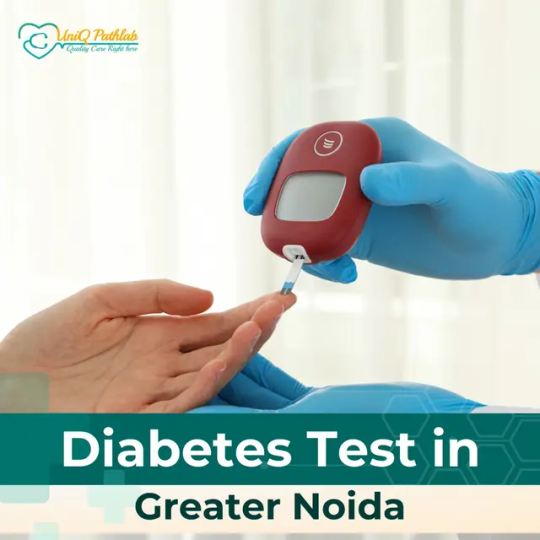
What is the ‘Diabetes Test in Noida Care’?
Types of Diabetes and Their Possible Causes
What are the risk factors of diabetes?
Conclusion
Living in the era of the pandemic, getting to know about some other rising health concerns is already overwhelming. In the 21st century, Diabetes is hailed as a silent killer threatening the lives of millions of people every year. The burden of diabetes in India is currently above 76 million and increasing rapidly day by day due to several triggering factors such as a sedentary lifestyle and consumption of high-calorie unhealthy food.
Even in the last few decades, diabetes test care has advanced bringing several novel medications to regulate blood sugar levels and devices to monitor glucose and insulin levels continuously. Still, there is a large part of the society where basic diabetes care facilities aren’t available to the patients. Drawing attention to this crisis, the theme “access to diabetes care” is actively revolving around providing support to manage their condition and avoid complications.
What is ‘Diabetes Test In Greater Noida Care’?
One of the complicated diseases, Diabetes test affects almost the entire body if it remains uncontrolled. From creating several issues with your blood vessels and heart to increased risk of eye conditions or sending tell-tale signs of kidney failure and frequent infections and so on. However, keeping things under your control and pushing such complications away from you isn’t unachievable. Our experts have shared some important tips to regulate sugar levels and lead a healthy life. Here is what you should do:
Managing blood pressure and cholesterol by not stressing too much and taking your prescribed medications on time.
Try to remain active throughout your day including 30-minute walks, exercise, or yoga
Pay attention to unusual symptoms, swelling in legs/ ankles, skin darkening, urine infections, etc.
Follow a healthy diet– restricting high-calorie or carbohydrates in your diet. Prefer to take home-cooked meals as possible. I
If detected diabetes, never miss taking insulin, or oral medications and monitor your blood sugar daily.
Visit your ophthalmologist at least once every year.
Refrain from excessive alcohol intake and regular smoking.
Keep your sleeping schedule intact
Take your oral health seriously as diabetes can affect your gum and teeth health.
Types of Diabetes and Their Possible Causes
Diabetes is a long-term medical disorder characterized by blood glucose levels that are frequently above normal. There are two types of diabetes, namely:
Type 1 diabetes
Type 1 diabetes is thought to be an autoimmune reaction in the body where the body’s immune system attacks its immune cells that produce beta cells in the pancreas. Also called juvenile or insulin-dependent diabetes, in type 1 diabetes, the pancreas can produce little to no insulin. Insulin therapy is necessary for Type 1 diabetics to manage their blood glucose levels. It frequently appears in childhood or shortly after that.
Type 2 diabetes
A common form of diabetes is associated with lifestyle and genetic factors. The pancreas' capacity to generate insulin may gradually decline with time. Insulin is a secret that helps break down the sugar into glucose, converting the food into energy. However, if the inulin level decreases in the bloodstream, the sugar levels increase simultaneously. The primary causes of Type 2 diabetes are obesity, a sedentary lifestyle, genetic factors, age, and gestational diabetes history.
What are the risk factors of diabetes?
There are numerous risk factors associated causing diabetes. The HbA1C test is beneficial to confirm the likelihood of diabetes and take effective measures to avoid diabetes complications.
Let’s discuss the main risk factors for diabetes.
Family history - The major risk of developing diabetes is having family records of this health issue. Commonly, this health risk passes from generation to generation. So, if you have type 2 diabetes, it must be that your family record has encountered this disease.
Excess body weight - Gaining weight above normal is also responsible for developing diabetes in people. Excess deposition of fat near the abdomen region is linked with insulin resistance.
Physical inactivity - The lack of physical activity or having a sedentary lifestyle can lead to type 2 diabetes. Exercise enhances the body's use of glucose and insulin.
Age - The risk of developing type 1 and 2 diabetes begins in childhood. Type 2 diabetes is more common in older adults, but obesity in children also increases its risk in younger ages. Diabetes can occur at any age and its risk increases after age 45.
Conclusion:
Summarize key points.
Encourage readers to prioritize diabetes testing in Greater Noida.
0 notes
Text
How To Lower Blood Pressure: Expert Tips By Dt Luna Jaiswal
Did you know that nearly one-third of Indian adults have hypertension? Yep, you read that right. But here’s the silver lining—lifestyle changes and stress management can play a huge role in preventing and managing this health concern.
What is Hypertension, Anyway?
So, before we delve into the nitty-gritty of our expert tips, let’s chat about what hypertension really is. In layman’s terms, it’s basically high blood pressure—when the force of blood against your artery walls is consistently too high. This not-so-friendly condition can lead to some serious health issues like heart disease, stroke, and even kidney failure.
How Can Nutrition and Lifestyle Management Help You?
Managing hypertension isn’t just about popping pills. Nutrition and lifestyle choices are like the backstage crew that keeps the whole show running smoothly. Eating right and leading a balanced life can not only help in low blood pressure treatment but can also be preventive.
Nutrition & Lifestyle Tips for Maintaining Healthy Blood Pressure Levels
Choice of Salt
You might want to rethink your salt choices. Sendha namak and Himalayan pink salt are what you should consume. They contain essential minerals and have lower sodium content as compared to regular table salt, making them a better choice for managing hypertension.
Fibre and Potassium-Rich Foods
Don’t skimp on veggies and fibrous grains, like millet and whole grains. Foods rich in potassium, like oranges, mango, mosambi, bananas, sweet potatoes, spinach, etc. are also highly beneficial. They can do wonders for maintaining a healthy blood pressure level.
Go Green
If you want a natural and holistic hypertension treatment, make room for seasonal green leafy vegetables in your diet. Eat them at least twice a week (except during the rainy season) during lunch. But make sure to cook them the traditional way.
Addlife Tip:
Sahjan ki sabji or Sahjan ka saag is a game-changer when it’s in season. When out of season, Sahjan water can get you covered.
Beetroot Juice
Beetroot is rich in nitrates, which can help dilate blood vessels, improving blood flow and lowering pressure. A glass a day keeps the high BP away, but remember to only take it when beetroot is in season.
CoCo Water
Believe it or not, coconut water can help in maintaining a healthy blood pressure level. It is hydrating and full of potassium!
Herbal Tea Time
Excessive caffeine can spike your blood pressure. So, limit the intake of your coffee as much as you can. You can swap it with herbal teas like chamomile tea, lavender tea, etc., that not only promote relaxation but also help lower blood pressure.
Healthy Snacking
Consider eating small portions of almonds, walnuts or bhuna chana. They are loaded with healthy fats and nutrients that can help in both hypertension and low blood pressure treatment.
Hydrate, Hydrate, Hydrate
Drinking plenty of water can also aid in maintaining a healthy blood pressure level. Aim for at least 8-10 glasses a day for best results.
Exercise Regularly
A 30-minute walk, yoga, or even light aerobics can serve as a non-pharmaceutical hypertension treatment. Exercise helps in releasing endorphins, which naturally lowers stress and, by extension, your blood pressure.
Sleep Matters
A consistent sleep schedule can be an underrated low blood pressure treatment. Your body needs rest to keep things balanced.
Addlife Tip:
Taking a moonlight walk for 20 minutes post dinner can help you sleep better.
Just Breathe
Stress can be a significant player in high blood pressure. Simple breathing exercises can go a long way in stress management. Trust me; your blood pressure will thank you!
Use The Power of Mindfulness
You might’ve heard the term “mindfulness” buzzing around social media these days. Well, it’s not just a fad. Practicing mindfulness through meditation can have a considerable impact on stress management. Just 10 minutes a day can help you focus and bring down those blood pressure numbers.
Addlife Tip:
Never quit your hypertension medication without consulting your healthcare provider, even if you observe any improvement in the condition. Instead of helping you, it can be extremely detrimental to your health.
Concluding Words
It might seem overwhelming, but managing your blood pressure is a marathon, not a sprint. Every little bit helps, and it’s never too late to start. Follow these extremely simple, doable, and effective tips and manage not just your blood pressure but also your overall well-being.
If you are looking for a guide and a personalised Hypertension Diet Plan in Lucknow, our team at Addlife are always here to help you every step of the way and get out of the clutches of hypertension. Let’s live a healthier life together! Happy heart-ing!
#DieticianforWeightLossNearMe#WeightLossdietitianNearMe#BestOnlineDieticianinIndia#BestDieticianinindia
0 notes
Text
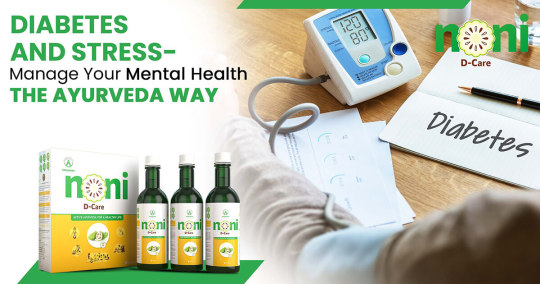
Ayurveda is an ancient Indian system of medicine that focuses on universal well-being, including the management of conditions like diabetes and stress through natural and lifestyle-based approaches.
Here are some Ayurvedic principles and practices for managing diabetes and stress while prioritizing mental health:
Dietary Recommendations
Balanced Diet: Ayurveda emphasizes a balanced diet tailored to your dosha (constitution). For diabetes, focus on low-glycemic foods like whole grains, vegetables, and lean proteins.
Spices: Incorporate spices like turmeric, cinnamon, and fenugreek, known for their potential to help regulate blood sugar levels.
Managing Stress
Stress Management: Manage stress by practicing deep, mindful breathing techniques to calm your mind. Unwind yourself with physical activities of your interest.
Stress Reduction Techniques: Spend time in nature, listen to soothing music and practice mindfulness.
Limit Stressors: Keep the sources of stress in your life at bay with the techniques explained above.
Time Management: Organize your tasks and priorities to reduce stress from a busy schedule.
Social Support: Seek support from friends, family, or a therapist when needed.
Relaxation
Meditation: Meditation is a practice that helps to reduce stress. Transcendental Meditation (TM) and mindfulness meditation are often recommended.
Yoga: Yoga asanas (postures) and pranayama (breathing exercises) can promote relaxation and balance the body’s energy.
Lifestyle Adjustments
Daily Routine (Dinacharya): Following a consistent daily routine can help stabilize blood sugar and reduce stress. This includes waking up early, regular exercise, and eating meals at the same time each day.
Quality Sleep: Ensure quality sleep to recharge and manage stress.
Stay Hydrated: Drinking warm water throughout the day is recommended in Ayurveda to help with digestion and overall health.
Herbal Remedies
Numerous herbs can be beneficial in Ayurvedic diabetes treatment, and aside from herbs, certain fruits also possess anti-diabetic properties, with Noni fruit, scientifically known as Morinda citrifolia, being one notable example. Noni is an evergreen tree characterized by its sizeable leaves and yellow fruits.
Noni D-Care: Noni D-Care’s primary ingredient is Noni fruit. This fruit juice is combined with potent herbs such as Saptarangi, Trikut, Punarnava, Kanysaar, Shalaki, Nirgundi, and Shilajit.
Noni D-Care is a formula that claims to be scientifically validated for its potential to support the recovery of the pancreas, kidneys, heart, and nervous system.
Noni D-Care’s objective is to empower individuals with diabetes, helping them regain a semblance of normalcy by effectively managing their diabetic condition.
Noni D-Care is designed to replenish stamina and enhance immunity, which may be compromised as a result of diabetes.
Noni D-Care facilitates improved digestion and boosts metabolism. It fortifies vital organs, guarding against diabetes-related damage.
Noni D-Care manages blood pressure levels.It addresses insomnia and offers stress relief.
Noni D-Care regulates hormonal imbalances, including thyroid disorders. It enhances neurological function.
Noni D-Care ameliorates joint and bone concerns. It is free from any adverse side effects
Let Us Conclude
You can gain insight from a qualified ayurvedic physician about your constitution (Prakriti) and any imbalances (Vikriti). It’s important to continue monitoring your blood sugar levels and follow your doctor’s advice.
By incorporating a healthy lifestyle, balanced and nutritious diet, adequate hydration, and following stress management techniques and Ayurvedic therapy such as Noni D-Care, you can keep diabetes and stress under control, easily manage your mental health, and lead a happy and healthy life.
Reference:- https://www.nonidcare.com/blog/diabetes-and-stress-manage-your-mental-health-the-ayurveda-way.html
#ayurvedic medicine for diabetes#best ayurvedic medicine for diabetes#diabetic syrup#Ayurvedic Diabetes Medicines#noni d care#nonidcare
0 notes
Text
Learn About the Surge in Hypertension Among the Youth - Hiranandani Hospital Kidney
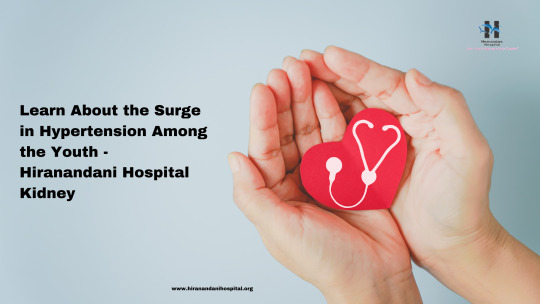
In the contemporary world, the primary factors contributing to the upsurge of hypertension in young individuals are stress and unhealthy lifestyle choices. Genetic and hereditary elements also play a role in this condition, making it crucial for those with such risk factors to exercise caution. Young people may also exhibit certain reversible factors that need timely identification.
Dr. Aditya Verma of Golf View Healthcare & Research Institute emphasized the importance of early diagnosis, as hypertension is often a silent threat, capable of reaching a life-threatening stage without warning symptoms. He stressed the necessity for regular medical checkups, particularly for those with a family history of hypertension. These checkups can commence as early as the age of 20, and further plans can be tailored based on the findings and individual risk profiles.
To address stress and poor lifestyle habits, Dr. Verma recommended adhering to general guidelines such as quitting smoking, adopting an active lifestyle, making dietary adjustments, and engaging in daily exercise. Stress management can be achieved through practices like Pranayam and Yoga Nidra, ensuring restful sleep, and cultivating qualities of kindness, love, honesty, and acceptance in life.
Causes of Hypertension in Young Individuals: Hypertension, or high blood pressure, can have various underlying causes in young individuals. While it’s more commonly associated with older age, it can also affect younger individuals due to various factors. Dr. Sujit Chatterjee, CEO Hiranandani Hospital, Powai, outlined potential triggers for hypertension in young individuals:
Genetic Predisposition: A family history of hypertension increases the risk of developing high blood pressure at a young age, especially if one or both parents have hypertension.
Unhealthy Lifestyle Choices: Factors such as an unbalanced diet, lack of physical activity, smoking, excessive alcohol consumption, and high stress levels can contribute to hypertension by causing weight gain, elevated blood cholesterol levels, and increased blood pressure.
Obesity: Being overweight or obese is a significant risk factor for hypertension, as it places additional strain on the heart and blood vessels, leading to elevated blood pressure.
Kidney Problems: Certain kidney conditions, like chronic kidney disease or renal artery narrowing (renal artery stenosis), can contribute to hypertension in some cases.
Hormonal Imbalances: Hormonal disorders, such as hyperthyroidism or abnormal adrenal gland function, can occasionally lead to hypertension.
Medication Effects: Specific medications, like non-steroidal anti-inflammatory drugs (NSAIDs), oral contraceptives, and certain antidepressants, can raise blood pressure levels in some individuals.
Read More :- Comprehensive Kidney Care at Hiranandani Hospital: Your Path to Optimal Health
Tips for Managing Hypertension in Young Individuals: Dr. Kaushal Chhatrapati, MD DM, FACC FSCAI FESC, Interventional Cardiologist, offered the following recommendations for dealing with hypertension in young individuals:
Always seek medical advice when high blood pressure is diagnosed in young individuals, as neglecting treatment can be extremely dangerous. Most cases of hypertension require medication.
Ensure you get at least 8 hours of uninterrupted sleep each day, as a well-rested body and mind are essential for preventing various diseases, including high blood pressure.
Engage in regular exercise, with just 35 minutes of moderate-intensity activity each day being sufficient to help control high blood pressure.
Maintain a healthy diet by avoiding junk and processed foods, consuming five servings of fruits and vegetables daily, and limiting salt intake.
Keep your body weight within the ideal range, as increased body mass index (BMI) is associated with higher blood pressure.
Prioritize stress management through various strategies.
Consider having a pet, preferably a dog, as studies have shown a lower incidence of cardiovascular diseases, including hypertension, in dog owners.
Eliminate alcohol, tobacco, and illicit drugs, as even small amounts can disrupt sleep and stimulate the sympathetic nervous system, leading to high blood pressure.
Dr. Chhatrapati emphasized that hypertension is increasingly being diagnosed in younger individuals, and while many cases are preventable through lifestyle modifications, all cases are treatable.
Food Items to Include in the Diet to Prevent Hypertension in Young Individuals: Controlling high blood pressure (hypertension) is a key factor in preventing heart attacks. This can be achieved through dietary and lifestyle changes. Dietician Garima Goyal listed several foods that may help lower elevated blood pressure:
Kiwi: Consuming two to three kiwis a day can aid in managing high blood pressure due to their high content of magnesium, potassium, fiber, and vitamin C, all of which have blood pressure-lowering properties.
Cinnamon: Adding cinnamon to your diet can help dilate and relax blood vessels, making it an effective blood pressure-lowering spice.
Bran Roti: Including whole grains like bran roti in your diet can reduce blood pressure, as the magnesium in bran helps lower systolic and diastolic pressure.
Beetroot: Consuming beetroot, either raw, steamed, or in kebab form, is beneficial for blood pressure management due to its high nitric oxide content.
Pistachios: These nuts can help manage blood pressure levels, with many studies showing positive effects on blood lipids and cholesterol when they replace some calories in the diet.
Hibiscus Flower Tea: Hibiscus tea can lower blood pressure, making it a suitable choice for those at risk of hypertension or with mildly elevated blood pressure.
It’s important to note that no single food can drastically reduce blood pressure, and it’s typically a combination of dietary changes and lifestyle modifications that yield the best results. Experts recommend following the DASH diet, which includes fruits, vegetables, and whole grains, for individuals with high blood pressure or those looking to maintain healthy levels.
#hiranandani hospital kidney transplant#hiranandani hospital kidney#hiranandani hospital powai news#hiranandani hospital reviews#hiranandani powai hospital#hiranandani hospital powai covid#hiranandani hospital kidney care#hiranandani hospital powai#hiranandani hospital kidney tranplant#hiranandani hospital
0 notes